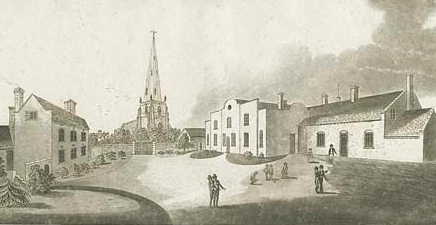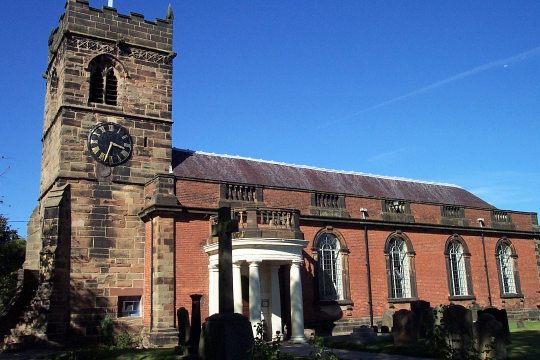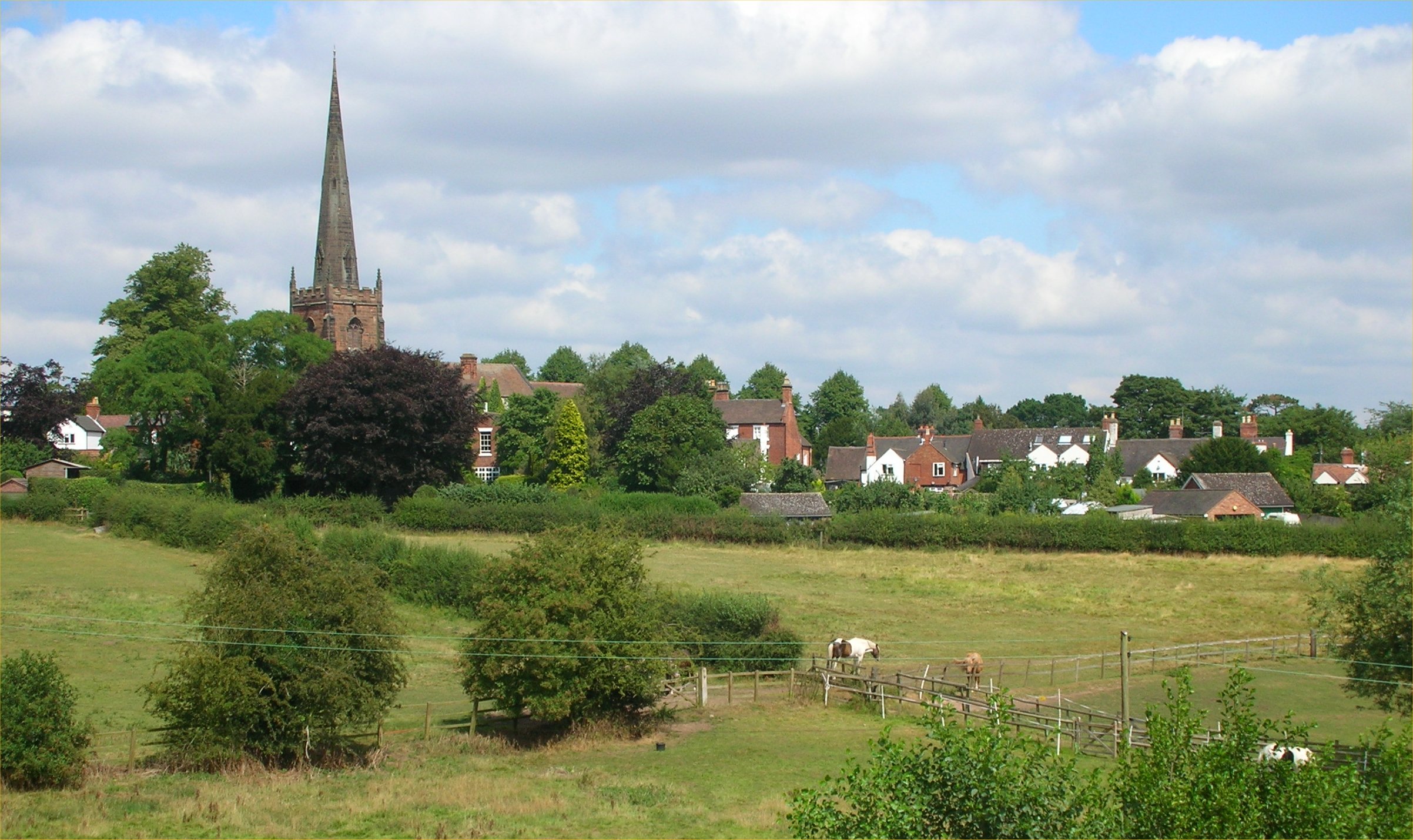|
Brewood Grammar School
Brewood Grammar School was a boys' school in the village of Brewood in South Staffordshire, England. Founded in the mid 15th century by the Bishop of Lichfield as a chantry school it was closed by the Dissolution of Chantries Act 1547. It was re-founded by Matthew Knightley and Sir Thomas Gifford in 1553 and survived as a grammar school until 1975 when its last headmaster, Roy Leafe, retired. It then became a mixed-sex middle school#United Kingdom, middle school in 1977. As a 20th-century grammar school it took a number of boarders half of whom lived in the school itself and the rest lived at Wheaton Aston Hall, and taught agricultural science. The school had a small attached farm with cattle and poultry. The original building does not survive. The earliest part of the remaining buildings, originally two houses donated to the school, dates from 1778. In 1799 these were enclosed in the school grounds by moving the road. They were rebuilt in 1856 as Rushall House (now Grade II li ... [...More Info...] [...Related Items...] OR: [Wikipedia] [Google] [Baidu] |
William Budworth
William Budworth (1699 – September 1745) was a schoolmaster at Brewood in Staffordshire, England. He taught several notable pupils, but he is most remembered for not employing Samuel Johnson as an assistant at Brewood Grammar School. Life and career Budworth was born in about 1699 in Marston on Dove, the son of the Reverend Luke Budworth BA, rector of Cubley and vicar of Longford, Derbyshire, and afterward rector of the parishes of Tillesham and Wellingham in Norfolk following the recommendation of Thomas Coke. He was educated at Derby School, the grammar school at Market Bosworth under Anthony Blackwall, and then at Christ's College, Cambridge (BA 1720, MA 1726).Literary Anecdotes of the Eighteenth Century By John Nichols, Samuel Bentley, p332, accessed 24 March 20 ... [...More Info...] [...Related Items...] OR: [Wikipedia] [Google] [Baidu] |
Brewood Grammar School 1799 7475-0
Brewood is an ancient market town in the civil parish of Brewood and Coven, in the South Staffordshire district, in the county of Staffordshire, England. Brewood lies near the River Penk, north of Wolverhampton and south of Stafford. Brewood is about east of the county border with Shropshire. Etymology The Domesday Book of 1086 documented the town as 'Breude'. The name is probably a compound made up of a Celtic, Brythonic word, and an Anglo Saxon, Old English word. The first element is the British word 'briga', which appears in modern Welsh as 'bre'. This is the most common of a number of Celtic place-name elements that signify a hill. It appears in various combinations, but sometimes on its own (as in Bray). Margaret Gelling, a specialist in West Midland toponyms, suggested that it was often misunderstood by the Anglo-Saxons as a name rather than as a common noun. Therefore, Anglo-Saxons would have thought that they had come upon a place that was called, by the natives ... [...More Info...] [...Related Items...] OR: [Wikipedia] [Google] [Baidu] |
Mary Whitehouse
Constance Mary Whitehouse (; 13 June 1910 – 23 November 2001) was a British teacher and conservative activist. She campaigned against social liberalism and the mainstream British media, both of which she accused of encouraging a more permissive society. She was the founder and first president of the National Viewers' and Listeners' Association, through which she led a longstanding campaign against the BBC. A hard-line social conservative, she was termed a reactionary by her socially liberal opponents. Her motivation derived from her Christian beliefs, her aversion to the rapid social and political changes in British society of the 1960s, and her work as a teacher of sex education. Whitehouse became an art teacher, at the same time becoming involved in evangelical Christian groups such as the Student Christian Movement (which became increasingly more liberal leading up to, and after, a 1928 split with the Universities and Colleges Christian Fellowship) and Moral Re-Arma ... [...More Info...] [...Related Items...] OR: [Wikipedia] [Google] [Baidu] |
Educational Institutions Disestablished In 1975
Education is the transmission of knowledge and skills and the development of character traits. Formal education occurs within a structured institutional framework, such as public schools, following a curriculum. Non-formal education also follows a structured approach but occurs outside the formal schooling system, while informal education involves unstructured learning through daily experiences. Formal and non-formal education are categorized into levels, including early childhood education, primary education, secondary education, and tertiary education. Other classifications focus on teaching methods, such as teacher-centered and student-centered education, and on subjects, such as science education, language education, and physical education. Additionally, the term "education" can denote the mental states and qualities of educated individuals and the academic field studying educational phenomena. The precise definition of education is disputed, and there are disagreements ... [...More Info...] [...Related Items...] OR: [Wikipedia] [Google] [Baidu] |
1450s Establishments In England
*
{{Number disambiguation ...
145 may refer to: *145 (number), a natural number *AD 145, a year in the 2nd century AD *145 BC, a year in the 2nd century BC *145 (dinghy), a two-person intermediate sailing dinghy *145 (South) Brigade, a regional brigade of the British Army that saw active service in both the First and the Second World Wars *145 (New Jersey bus), a New Jersey Transit bus route *145 Adeona, a main-belt asteroid *Alfa Romeo 145, a 3-door hatchback *Honda 145, a compact car See also * List of highways numbered 145 The following highways are numbered 145: Australia * Lower Barrington Road, Paloona Road, Melrose Road, Bellamy Road, Forthside Road (Tasmania) * Inverleigh–Winchelsea Road (Victoria) Canada * Winnipeg Route 145 * New Brunswick Route 145 * ... [...More Info...] [...Related Items...] OR: [Wikipedia] [Google] [Baidu] |
Grade II Listed Educational Buildings
Grade most commonly refers to: * Grading in education, a measurement of a student's performance by educational assessment (e.g. A, pass, etc.) * A designation for students, classes and curricula indicating the number of the year a student has reached in a given educational stage (e.g. first grade, second grade, K–12, etc.) * Grade (slope), the steepness of a slope * Graded voting Grade or grading may also refer to: Music * Grade (music), a formally assessed level of profiency in a musical instrument * Grade (band), punk rock band * Grades (producer), British electronic dance music producer and DJ Science and technology Biology and medicine * Grading (tumors), a measure of the aggressiveness of a tumor in medicine * The Grading of Recommendations Assessment, Development and Evaluation (GRADE) approach * Evolutionary grade, a paraphyletic group of organisms Geology * Graded bedding, a description of the variation in grain size through a bed in a sedimentary rock * ... [...More Info...] [...Related Items...] OR: [Wikipedia] [Google] [Baidu] |
Defunct Grammar Schools In England
{{Disambiguation ...
Defunct may refer to: * ''Defunct'' (video game), 2014 * Zombie process or defunct process, in Unix-like operating systems See also * * :Former entities * End-of-life product * Obsolescence Obsolescence is the process of becoming antiquated, out of date, old-fashioned, no longer in general use, or no longer useful, or the condition of being in such a state. When used in a biological sense, it means imperfect or rudimentary when comp ... [...More Info...] [...Related Items...] OR: [Wikipedia] [Google] [Baidu] |
Grade II Listed Buildings In Staffordshire
Grade most commonly refers to: * Grading in education, a measurement of a student's performance by educational assessment (e.g. A, pass, etc.) * A designation for students, classes and curricula indicating the number of the year a student has reached in a given educational stage (e.g. first grade, second grade, K–12, etc.) * Grade (slope), the steepness of a slope * Graded voting Grade or grading may also refer to: Music * Grade (music), a formally assessed level of profiency in a musical instrument * Grade (band), punk rock band * Grades (producer), British electronic dance music producer and DJ Science and technology Biology and medicine * Grading (tumors), a measure of the aggressiveness of a tumor in medicine * The Grading of Recommendations Assessment, Development and Evaluation (GRADE) approach * Evolutionary grade, a paraphyletic group of organisms Geology * Graded bedding, a description of the variation in grain size through a bed in a sedimentary rock * Meta ... [...More Info...] [...Related Items...] OR: [Wikipedia] [Google] [Baidu] |
Defunct Schools In Staffordshire
{{Disambiguation ...
Defunct may refer to: * ''Defunct'' (video game), 2014 * Zombie process or defunct process, in Unix-like operating systems See also * * :Former entities * End-of-life product * Obsolescence Obsolescence is the process of becoming antiquated, out of date, old-fashioned, no longer in general use, or no longer useful, or the condition of being in such a state. When used in a biological sense, it means imperfect or rudimentary when comp ... [...More Info...] [...Related Items...] OR: [Wikipedia] [Google] [Baidu] |
Educational Institutions Established In The 15th Century
Education is the transmission of knowledge and skills and the development of character traits. Formal education occurs within a structured institutional framework, such as public schools, following a curriculum. Non-formal education also follows a structured approach but occurs outside the formal schooling system, while informal education involves unstructured learning through daily experiences. Formal and non-formal education are categorized into levels, including early childhood education, primary education, secondary education, and tertiary education. Other classifications focus on teaching methods, such as teacher-centered and student-centered education, and on subjects, such as science education, language education, and physical education. Additionally, the term "education" can denote the mental states and qualities of educated individuals and the academic field studying educational phenomena. The precise definition of education is disputed, and there are disagreement ... [...More Info...] [...Related Items...] OR: [Wikipedia] [Google] [Baidu] |
Conservative Party (UK)
The Conservative and Unionist Party, commonly the Conservative Party and colloquially known as the Tories, is one of the two main political parties in the United Kingdom, along with the Labour Party (UK), Labour Party. The party sits on the Centre-right politics, centre-right to Right-wing politics, right-wing of the Left–right political spectrum, left-right political spectrum. Following its defeat by Labour at the 2024 United Kingdom general election, 2024 general election it is currently the second-largest party by the number of votes cast and number of seats in the House of Commons of the United Kingdom, House of Commons; as such it has the formal parliamentary role of His Majesty's Most Loyal Opposition. It encompasses various ideological factions including One-nation conservatism, one-nation conservatives, Thatcherism, Thatcherites and Traditionalist conservatism, traditionalist conservatives. There have been 20 Conservative Prime Minister of the United Kingdom, prime minis ... [...More Info...] [...Related Items...] OR: [Wikipedia] [Google] [Baidu] |
Sir Patrick Cormack
Patrick Thomas Cormack, Baron Cormack, (18 May 1939 – 25 February 2024) was a British politician, historian, journalist and author. He served as a member of Parliament (MP) for 40 years, from 1970 to 2010. Cormack was a member of the Conservative Party and was seen as a one-nation conservative. Before entering Parliament, Cormack was a teacher. He was elected for Cannock at the 1970 general election. Following boundary changes he was elected for South West Staffordshire in 1974, renamed South Staffordshire in 1983. He was elected chair of the Northern Ireland Affairs Select Committee in 2005. He was also twice a candidate for the speakership of the House of Commons. After standing down from the House of Commons in 2010, he served as an active life peer in the House of Lords. Early life and career Cormack was born to Thomas Charles Cormack, a local government officer and master mariner, and his wife Kathleen Mary Cormack in Grimsby just before the outbreak of the Second ... [...More Info...] [...Related Items...] OR: [Wikipedia] [Google] [Baidu] |







